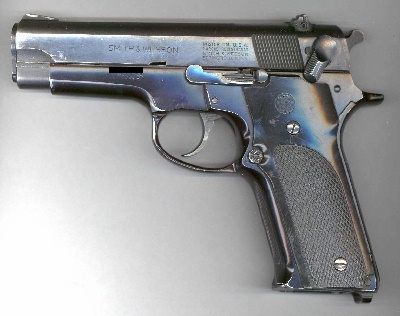Nov 01, 2009 Aside from the obvious cool factor: What else is there to like about the Smith and Wesson 645 and 4506? I don't own a double action automatic, and am looking to get one in 45 ACP, and I'm a big fan of 'Miami Vice' so it looks like the 645/4506 are what I'm looking for. View & download of more than 39 Smith & wesson PDF user manuals, service manuals, operating guides. Watch user manuals, operating guides & specifications.
| Smith & Wesson Model 645 | |
|---|---|
| Type | Semi-Auto Pistol |
| Place of origin | United States |
| Production history | |
| Manufacturer | Smith & Wesson |
| Produced | 1985-1988 |
| Specifications | |
| Mass | 2.3 lbs (1.06 kg) |
| Cartridge | .45 ACP |
| Caliber | .451 in (11.45 mm) |
| Action | Double Action/Single Action |
| Effective firing range | 165 ft (50 m) |
| Feed system | 8-Round Box Magazine (+1 in chamber) |
| Sights | Fixed Iron Three-Dot, Adjustable available |
The Smith & Wesson 645 and Smith & Wesson 745 are second-generation semi-automatic pistols which predates Smith & Wesson's 4500 series of handguns. The S&W 645/745 is chambered for the .45 ACP cartridge. The S&W 645 is constructed almost entirely from stainless steel and is thus extremely resistant to harsh weather conditions, whereas the S&W 745 has a stainless steel frame and a blued carbon steel slide. The S&W 645 was introduced in 1985 and discontinued in 1988. The S&W 745 was produced from 1986 to 1990, primarily as a single-action competition gun for IPSC shooting.
History[edit]
Smith & Wesson (S&W) began experiments with .45 ACP-firing pistols in 1984, and produced their first one, the Model 645, in 1985. Public demand led to the development of this series. The series is a .45 ACP version of their 9mm Parabellum weapons. They are normally double-action weapons, or what Smith & Wesson refers to as a traditional double action. They generally have a barrel bushing press fitted into the muzzle end of the slide instead of a separate barrel bushing like a 1911 pistol. Like many Smith & Wesson models, each variant was generally in production for only a few years.[1]
The Model 645 was introduced in 1985, and produced until 1988.[1] It has a stainless steel frame and slide, an ambidextrous safety/decocker, a squared trigger guard, and black plastic grip plates.[1]
The Model 745, built from 1986-1990, was a single-action target version of the Model 645, with a match barrel, Novak sight (an adjustable rear sight was optional), an adjustable trigger stop, stainless frame,walnut grip panels and blued slide. It does not have ambidextrous controls, but does have a half-cock safety. The pistol is rollmarked 'IPSC 10th Anniversary 1976-1986'.[2]
Smith & Wesson changed its numbering system with the introduction of its third generation iteration, where a four digit numeral replaced the earlier three digit numeral designators. One of the first in this series was the 4505; this is essentially the 645 with only the safety catch ambidextrous and a blued finish. A Novak Lo-Mount rear sight was installed on a small number of 4505s. It was produced only in 1991. The Smith & Wesson Model 4506, is made of satin finished stainless steel, a Novak Lo-Mount rear sight later in the series, and a Xenoy wrap-around grip with either a straight or arched backstrap. After 1998, the 4506 had a rounded trigger guard profile, which replaced the earlier squared profile inherited from the 645. The 4506 was produced from 1988-2001.[1]
The S&W 645 was used in Miami Vice by the character Vice Detective Sonny Crockett in seasons 3 and 4 of the TV series.[3]
References[edit]
Smith & Wesson 645 Model
- ^ abcdSweeney, Patrick (2004). 'The 4513 TSW: A tactical 45 with flair'. The Gun Digest Book of Smith & Wesson. Iola, Wisconsin: Gun Digest Books. pp. 257–261. ISBN978-0-87349-792-3. Retrieved 14 February 2012.
- ^Supica, Jim; Nahas, Richard (20 December 2006). Standard Catalog of Smith & Wesson. Iola, Wisconsin: Gun Digest Books. p. 294. ISBN1-4402-2700-4.
- ^Ayoob, Massad (2008). The Gun Digest Book Of Concealed Carry. Iola, Wisconsin: Gun Digest Books. p. 144. ISBN978-0-89689-611-6. Retrieved 14 February 2012.
Smith And Wesson 645 Price

